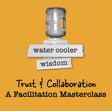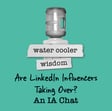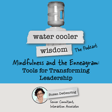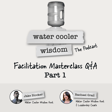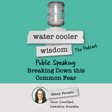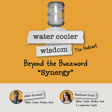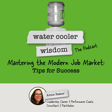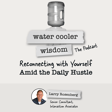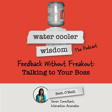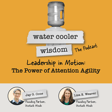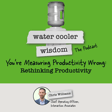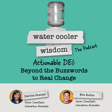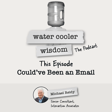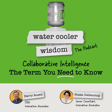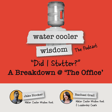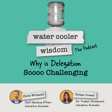Become a Creator today!Start creating today - Share your story with the world!
Start for free
00:00:00
00:00:01

Leadership Evolution: Coaching for Today's Change
Join us on "Water Cooler Wisdom" as we delve into the state of leadership coaching with Executive Coach Rachel Bassignani. Rachel, founder of Catalyst, brings her 15 years of experience in scaling global organizations to discuss the challenges leaders face today.
From layoffs and strategic shifts to the rise of AI, discover how executive coaching can empower leaders to excel amidst change. Learn how Rachel's expertise in organizational development and entrepreneurship helps high-growth tech founders and venture capital firms retain top talent.
Resources Mentioned:
Grammarly App
Books by Carl Jung
Transcript
Leadership Challenges and Adaptation
00:00:10
Speaker
In today's business world, leaders face an endless onslaught of challenges. From navigating layoffs and leadership transitions, to adapting to strategic shifts and the evolving role of artificial intelligence, there's always a new hurdle. In response, both leaders and their teams must continually evolve, acquiring new skills to stay ahead. This might explain why coaching has become a highly valued resource for managers today.
Interview with Executive Coach Rachel Basagnani
00:00:36
Speaker
In this episode, we sit down with executive coach and business expert Rachel Basagnani to discuss the current business landscape and how executive coaching can empower us to excel amidst change. Hello and welcome to another episode of Water Cooler Wisdom. I am Jake Blocker. And I am Rachel Grahle. Rachel, it's great to see you. Another day. Glad to be here. Yes, yes. Today's topic is an interesting one, and I think something you have some experience in as well. Something very near and dear to my heart and my daily activities. Absolutely. And it happens to be another Rachel that we're bringing on, so that's awesome. So I double the Rachel. Double the Rachel. Double the overthinking about leadership challenges. That's the saying. That's the saying.
Post-2020 Uncertainty and Leadership Coaching
00:01:25
Speaker
This one, I wanted to ask you as a leadership coach yourself, what came to mind when I was thinking of this topic is how things have shifted since 2020. There's always been some sort of uncertainty, but I feel like after 2020, it's just been to the extreme and we've never had a break. How's it changed for you as a leadership coach with us?
00:01:46
Speaker
Oh, gosh, it's such a good point. I mean, uncertainty has always been a reality, I think, especially for leaders. But yeah, since 2020, it feels like really anything can happen. We're like, oh, global pandemic, major unrest, global unrest, um ah total disruption in the way we think about technology and what's possible. So yeah, it is nonstop. And I think the way that I approach it, the thing that is so powerful to me about executive coaching is that um you can get skills like collaborative skills and leadership skills. And there's so many amazing resources and books, and I do recommend that everyone avail themselves of them. But now more than ever, as change is increasingly
00:02:34
Speaker
like rapid and intense and kind of emotionally charged for people. there It has to be accompanied by an inner mindset shift, an inner kind of resilience, adaptability. And that's something that I think can really be supported by having somebody there to talk you through it, hold your hand a little bit. So it's this pairing, this inner ah mindset and outer skill development. Hmm. I absolutely love it. I think that's a great approach. Well, I think that's also a great segue into our topic. You're ready to get going. I am ready to get going. I just think that our guest is is brilliant. She's someone I know really well. She's a deep thinker, so I'm excited to talk to her today. Yes, let's do it. All right.
Entrepreneurship and Talent Retention
00:03:24
Speaker
All right. Welcome, Rachel. So Rachel, as a leadership coach and consultant, Rachel is a champion of individual and organizational evolution.
00:03:33
Speaker
With expertise in entrepreneurship and organizational development, she fosters collaborative environments in her high growth clients. As a founder of Catalyst, Rachel assists early stage tech founders and venture capital firms in retaining and developing the most sought after talent in their industries. With 15 years of experience scaling organizations globally, and she's held roles such as general manager, COO, and management consultant. Rachel holds an MBA from Cornell Johnson School of Management with further studies in organizational behavior and leadership psychology. She's a certified professional coactive coach and licensed human element practitioner. practitioner excuse me Also skilled in yoga and mindfulness instruction. Welcome and Namaste.
00:04:21
Speaker
Great to be here. Appreciate the intro. So happy to have you here. I also have the benefit of having known Rachel for 20 plus years and have seen her brilliance only grow. So I'm so excited to have you here. and i'm gonna kick us off for this conversation. So a lot of our leaders, as you know, are interested kind of in the trends in business today. Most of them are either consultants or leaders in various organizations. So with all of your close relationships to people in all kinds of business, from blue chips to high growth startups, we're really just eager to hear your insights today.
Post-2023 Layoffs and Talent Management
00:05:03
Speaker
So could you share your perspective on what's the current business climate? What's going on for organizations? What do you see as some of the main challenges right now? Yeah, I mean, I think this is a great question. um And in terms, I'll kind of answer this, at what we're seeing in the talent landscape, kind of how culture feels across different industries and sizes of companies. um But I think one thing to point to is we're coming through the first quarter of 2024 is feeling the aftermath of 2023. And the way that we had layoffs kind of sweeping the enterprise, global conglomerate companies, tech companies, we had a lot of um retraction in the early stage market and venture funding circles. So, you know, I think
00:05:53
Speaker
in the current climate, everyone's starting to like peek their head out. It feels like the sun is shining literally and and figuratively as we enter spring here. um You can see that deals are flowing, investment is flowing a little bit. It's not kind of a heyday out there, but everyone is starting to feel so somewhat more confident as we come out of 2023. That being said, I do think You know, as we're in companies working closely with founders and senior executives and talent partners, um we are dealing with the aftermath of the impact that these layoffs and this attrition had from 2023. And we're looking closely at, you know, I think when we walked through the layoffs, we think a lot about the people who lost their jobs. We think a lot about the companies who were reaching for funding or reaching for sales. I mean, the amount of startups that
00:06:45
Speaker
didn't hit sales targets last year and the impact that had on sales organizations and stressors and thinking about their next round of funding. I mean, all of these areas were really impacted significantly last year. And as talent professionals, we're now looking at not so much what happened to the folks who were let go and how companies really made it through that survival point, but how people feel in organizations now. And I think you know, inevitably, we see a lot of damage to talent brands, we see a lot of anxiety and culture, we see um a lack of trust that, you know, people in their companies have now like, I'm safe for now, but how long am I safe? Questions and questions of safety and security. But furthermore, like,
00:07:32
Speaker
Even though I still have my job, what's available to me in terms of the impact that I can really make now, the growth that I'm able to have at my company. And so a lot of folks who were left behind, the folks that didn't you know get impacted by layoffs, they're rattled. They have questions. um they are left in roles and and in companies, frankly, that they're not entirely happy or comfortable with anymore. So what are we as talent professionals and um human capital professionals doing and can do in the aftermath to help one our companies and our senior leaders um instill confidence, but also to really find ways to motivate and engage their employees in light of what
00:08:21
Speaker
we are seeing in the aftermath is the fact that know if you were in a big company, blue chip company like Google or something like that, maybe you weren't impacted by a layoff, but now you don't have upwards trajectory, you've reduced scope, you're being asked to do more with less. you know, which is a common phrase.
Startups and Growth Opportunities
00:08:40
Speaker
More with less, more with less. Right on a new team that was merged. Sorry, everyone's triggered right now. blessly Because it impacted almost every business and
00:08:53
Speaker
What's interesting is that for our high-growth technology companies or our startups, that is always the premise, do more with less. And so you have these scrappy generalists who are used to doing it. But the upside of that is getting opportunities to do really cool work, things that might not have come to you if you weren't a big company, to have an opportunity to have an impact. So the do do more with less is kind of the game in a startup. When you are going to do more with less and you're in a you know a mature company where there's no room for growth, but there's still a lot of the hierarchy and bureaucracy that comes with a big company. So you're just doing more with less, but you're not getting more impact or scope. It doesn't mean you're going to get to a very senior role quickly. you know None of that exists for our folks that have really enjoyed kind of these upward trajectories and these
00:09:43
Speaker
you know, steady growth companies like our enterprise level, Google's and, you know, in media and, you know, Microsoft's of the world. So the people who have been left behind have their own grieving process to some degree. having been happy and companies haven't been happy and hopeful about their roles and impact. And now they just are feeling like, wow, I have less leadership opportunity. I have to do more with less, but there's no, there's never going to be an increase in and pay for quite a while or a promotion for quite a while. so Just a pat on the back. Yeah. that's Good job. We're trying to figure out how do we motivate and engage and, and compelling for these folks.
00:10:24
Speaker
These are the big questions that we're kind of answering today. So that was a long winded answer, but that's kind of, I think what we're doing. That was perfect. Yeah. Great context setting. Yeah. And that really, that leads into my question here is, you know, in terms of development programs, what should L and D professionals consider to effectively nurture their teams?
Generalist Skills and Adaptability
00:10:46
Speaker
Yeah, I mean, you know, the do more with less, and I think something we're seeing emerging in the AI conversation as well, right, where I'm spending a lot of time like listening to a podcast and industry leaders in that regard who are um future forecasting, let's say what what what that's gonna look like for many of the workforce, we're almost drifting back into a generalist mindset, right? And that's, that is, um you know, very contextual in
00:11:14
Speaker
High tech companies are always going to need subject matter experts. You're always going to need people who have deep expertise and deep knowledge. and whatnot. But to do more with less, the be responsive to market evolution. This is requiring, I think, people to figure out how to be more adaptive in the moment, how to be scrappier, how to be more strategic, how to be more efficient and effective in their roles, um as their one carrying increased workloads are going to be asked to fold in different types of work processes or
00:11:48
Speaker
um roles into their new roles and to be able to develop other people around them for that same reality. ah We're drifting back into terms of like soft skills development, being critical and crucial um for two two pieces developing mindsets um that really center on critical thinking and strategic thinking that are going to make people better more productive employees like can you can I hand you a project can you take it and run with it will you think critically and strategically about the most effective way to get this done through people with people um positive outcomes so that is becoming you know we're swinging back to that like soft skill landscape more than anything and you know we are seeing a lot of our lnd and our talent management and our you know senior executives coming into us for
00:12:43
Speaker
giving these skill sets and and helping people develop so that they feel more efficacy in their roles and they feel more autonomy and they feel more empowered to really deliver in ah across multiple dimensions, I guess is the way to look at it. yeah Yeah, it's interesting because that's not necessarily the natural state for some people. Some people are much more comfortable um having a directive leader saying, here's what you do next. This is the exact metrics for success. And people are having to really just kind of adapt and and use the tools provided to them.
00:13:26
Speaker
Do you think that this might be part of the reason why coaching skills is such a hot
Strategic Communication and Coaching
00:13:32
Speaker
topic right now? Like why that's such a desired trait for managers? um why do Why do you think, is this part of the picture? Like people need to be coached to build up all of these different skills and become more generalist? Well, I i think that yes, coaching skills are probably the most highly sought after sought skill right now, whether it's um engaging outside professionals to give coaching or to have coaches come in and teach managers how to be better coaches to their direct reports and to their peers and colleagues. I believe that coaching skills are you know so prominent and in the conversation right now because to me, they are a strategic communication skill and they are a strategic thinking skill. And so when we are in a coaching conversation,
00:14:23
Speaker
We get kind of off our hamster wheel of thinking. We are opening the aperture of what's possible in the world. We do that through empathy. We do that through visioning. We do that through forcing function of asking somebody what's possible. What's and what's another story we could tell about this? What's another way we could approach this problem? And so what you do is you take a brain that no matter how bright it is, it's naturally going to be lazy and efficient. When you put it into a coaching conversation, you really force that brain to explore possibility, explore options, explore perspectives. And when it starts to do that, anybody who starts to do that becomes much more self-aware, become much more aware of other people around them.
00:15:14
Speaker
So we find two things. It bolsters soft skills, but it also bolsters like efficacy and resiliency in a person. And it allows them to realize that there's always more to the picture. There's always more that's possible, always a different way to think and approach a problem, a relationship, an opportunity or a challenge. Right. I love what you've just described because it seems like that's purpose built for the challenges that you laid out, that businesses are going through, like the power of coaching for the challenges of our of the moment in business.
00:15:53
Speaker
um And i'm I'm curious, I know you've been coaching a long time, you've had a lot of interaction with different coaches, um coached a lot of different people. What do you think are the skills that make for
Understanding Human Potential in Coaching
00:16:04
Speaker
a great coach? how What are the things that make it really effective? i was I was thinking about this as you know we were contemplating exploring this topic a little bit. And um I was pushing myself to think about what are the great skills that great coaches possess. And something that came to me this morning was that, and this might seem kind of out of business boundaries, but to some degree, I think that great coaching is rooted
00:16:34
Speaker
in kind of deep existential or spiritual um awareness. And the way we take that out of the abstract and we bring it back into the coaching moment is saying a great coach and a great coaching conversation is going to be rooted in human potential and human possibility. And when the conversation is really anchored in what is possible based on infinite human potential, human beings' ability to tackle challenges, come up with creative solutions, build impactful businesses that create values to societies around them. I mean, this is really the biggest kind of underlying question to why we wake up every day and get to exist and we go to work with other humans and it's complicated and it's messy. And so when we bring people back to a place where one, they become aware of what's possible,
00:17:34
Speaker
and They do that by exploring perspective. They do that by exploring divergent thinking, to convergent thinking, and back and forth. and They do that by exploring ah sort empathy, what other people are experiencing, or what what they're thinking, or how they might react, or how they might enjoy a product, or whatever it is. right powerful coaching conversations are really rooted here for me, I believe. And so great coaching skills um and great coaches tend to have their own individual roots in this kind of work.
00:18:09
Speaker
arena. um They have to be willing to go where they ask others to go. Yeah. And, and to realize that at the end of the day, you know, the thing that we're aiming for is, is to really have a greater impact on our own lives, to be able to create and build lives that we are enjoying and are fulfilling on our challenging us and growing us and to do that in relationship with others and then to see what the impact is when we get a bunch of people together and we say let's try to get along for 20 minutes or two days or you know four years or a decade to see what we could bring into the world that we wouldn't have otherwise been able to bring into the world on our own. And so you know I had a hard time answering that but this was kind of the answer that came to me and obviously there are
00:19:01
Speaker
powerful tactical things that we use. we we do We teach peer coaching circles where we teach you know leaders and companies how to coach and they coach each other and then they get coaching. And so it's like this multidisciplinary learning environment. And you do teach these tactical tools such as active listening, reframing, ah things like naming it or kind of practical applicable ways of like coaching skill sets. But really what it's rooted in is deep listening and curiosity about what is happening for the person in front of me.
00:19:34
Speaker
right? Where are they limiting themselves? Where are they holding themselves back? What is possible for them and and inviting them into that curiosity about themselves and about the world and about others. And so this is to me where exceptional coaching really takes place is is quite very much in the moment and bringing people into that moment to explore what's really here and rich and possible rather than all the distractions that we have about what that person said at the meeting.
Focus and Self-awareness in Coaching
00:20:05
Speaker
yeah i mean What I got to make for dinner tomorrow, what my boss expects of me, you know, the brain is naturally pulled in 320 directions in a given moment and is quite chatty and distracted and it it enjoys being in that place. But what we want is to harness the power of the mind, of the brain, of the heart, of the will, and to really bring it into focus and then apply it and direct it towards important initiatives, strategic initiatives, tough conversations, um positive outcomes, and really focus, focus, focus the mind and the person so that they can be the best version of themselves and give the best version of themselves to their companies, to their families, to their communities, and to themselves.
00:20:48
Speaker
so That was my that's where I arrived at that today. I love it. Yeah, I agree. I i took some notes on some timestamps because i' like I think you just made some clips for us. That was great. Well, I am going to bring us to a close here. I feel like time just sped by, but we have some ah very important questions for you that are the toughest questions you could possibly think of. I hope you're ready for this. All right, so it's time for some hot seat questions here. First one, coffee or tea? I was a diehard coffee girl up until a month ago, so. not Good for you. Made the change.
00:21:36
Speaker
ah The coffee is in the heart. We we understand. yeah Relatable content. on detro and You said it's your last meal. Are you having a breve latte or a cup of black tea? I'm saying breve latte. I agree. All right. Second one. Early bird or night owl? Early bird. Yeah. and Also good for you, man. ah App software or platform that you swear by? I couldn't really live without my Grammarly. A nice one. I find editing emails and and decks and everything incredibly tedious and still having anything like Grammarly, chat GPT, just any support in the editing realm, I think is such a time saver and also a cognitive bandwidth saver. Like I just have things to be doing with my time. So the kids don't know how good they have it. Yeah, I know. It's a game changer.
00:22:34
Speaker
I know I don't have to, I just can type things and let the brain go and then chat to you, please make this work. um Make it pretty. Make it pretty. I think broad level technology truly making that kind of just impact on just everyday life, which is incredible. Oh yeah. It's so nice. and i do yeah What about a book that has made an impact on you? i I saw this in the prompt today and I started thinking about what's the most impactful book I've ever read. It doesn't have to be the most. We know there are several. I would say you know in terms of my own personal life philosophy, my professional philosophies, everything I've really read by Carl Jung, that's like probably, it's
00:23:25
Speaker
I love Carl Jung because he always had this kind of psycho-spiritual, psychological, rooted in evidence-based frameworks and research, but really took into consideration the whole person and the whole life. And I think that is so essential to any framework or philosophy is really incorporating like the mental, spiritual, emotional, physical components of of our experiences, human beings. and um integrating that into everything that we try to do and and consider in this life. So ah I'll leave that there. Nice. All right. Last question. The most important one. If you could have a water cooler chat with anyone dead or alive, who would it be and why?
Leadership Models and Authenticity
00:24:14
Speaker
I think it's gonna sound cliche, ah right, for maybe in the moment, but I would honestly say Michelle Obama right now. And I'm gonna explain that because how I'm defining success in my life, or when I look at success in other people that I maybe want to model or emulate or achieve, there is a beautiful balance in her as a human being, as I observe her, of of aliveness and and genuine aliveness and owning her own significance, but having boundaries around it. Like she's willing to give herself to the world, but she's going to dress in the manner she wants. She's going to tell you the truth about marriage and children and lives and success, about the ugly.
00:24:58
Speaker
But she's also going to articulate those things in a way that are incredibly responsible for the impact that our words are going to have. And and I think the ability to be authentic and to also own your impact is such a ah beautiful dynamic and something I feel a lot of. people struggle with, to be honest with you. And it's um just an incredible, I think, contribution that she brings to every conversation and whenever her presence is is out there and around. So that would be mine for now. yeah She's one that knows her brand, knows it quite well. I love that. Yeah, the ability to be authentic and also know your impact. I think that's really beautifully articulated. yeah
00:25:41
Speaker
um this really irresponsible brash kind of in some of that, you know, I won't get too deep into what I. rep Yeah. And i that's why I think it's an art form, because I do think in, you know, we want to always push the level of our authenticity and how we define that because our authenticity, I think it's, um I don't know if it's Adam Grant, but there's an article out there called um The Authenticity Paradox, I believe, but it really talks about how you can trap yourself and what you believe is your authentic self and without giving a lot of credibility to your future self or your ideal self and how you might grow into one day that being your most authentic self.
00:26:26
Speaker
So ah putting ourselves in a box, but really understanding that when we do show up in the world, it has an impact, right? People feel us, they feel our energy, they hear our words. And I think it's beautiful to take responsibility for that too. Yeah.
Conclusion and Contact Information
00:26:41
Speaker
Well, the last thing, uh, just to know where, where can we find you? Where can the people find you? wow I mean, we're all over over the internet. I'm just kidding. bye me on tikok if no just We are at www.thecatalyst.io. We are a boutique talent development firm that is founded in Silicon Valley. We do a lot of executive coaching, executive team development, and executive search for you know early stage high growth tech companies and then also multinational companies. so you know
00:27:16
Speaker
done a lot of work in Bain and Deloitte, Google, um some of the biggest best names out there and some of our most exciting high growth companies as well. So we do a lot of work across all of those dimensions and industries and you know, we're out here and we'd love to connect with anybody and and continue the conversation. Well, your clients are lucky to have you. We are lucky to have you and I have been lucky to have you in my life for all of these years. Thank you so much for coming on and joining us today, Rachel. Thank you all so much for listening and we'll catch you next time at the water cooler.
00:27:50
Speaker
Thanks for listening to Water Cooler Wisdom. This podcast is brought to you by Interaction Associates, a leading professional development and leadership training organization whose mission is to help people work better together. If you'd like to learn more, visit interactionassociates.com. If you have questions, comments, or are interested in collaborating with this podcast, you can email us at watercoolerwisdom at interactionassociates.com.

